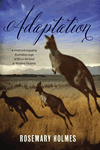
Adaptation
Martin and his father poured water from both hoses to flood the room in the Small Cottage, where inside a grotesque blackened figure had just collapsed to the floor amongst the flames. Read more about “Adaptation”

Book Publishers
Review “Adaptation” By Rosemary Holmes Sid Harta Publishers, Melbourne Australia “The past is a foreign country; they do things differently there” wrote L.P. Hartley in 1953 in the opening line in The Go-Between. And while much that is foreign may be charming and quaint for a brief holiday exposure, to truly gain an understanding of another world both time and a talented interpreter are required. In Adaptation, Rosemary Holmes' skilful narrative provides the interpretive links which connect generations of the fictional Nelson family across the early and middle decades of the twentieth century, bringing a rural Victorian past into focus for the 2016 reader.
The opening scene of Adaptation is grandson Martin Nelson's 1964 graduation ceremony, where three generations of Nelsons have gathered to celebrate the award of the first agricultural degree in the family. Martin and his proud sisters Clara and Tania feel a great sense of belonging at Kartorr, the family farm. They have enjoyed their involvement in this close-knit farming community and been nurtured by their family's long association with the land, but sense change is in the air. It doesn't take long for Martin's vision to be fixed firmly on a different future for the Nelsons, involving bold plans for changes to modernise Kartorr. While Martin is intent on diversification, backed by his Pa, his father Jim is content to cling to methods he's always known, confident his ways are best. Holmes highlights some of the different roles which rural women played in Australian society during these decades through her portrayal of characters such as Nelson matriarch Sophie, daughter-in-law Louise and granddaughters Clara and Tania. Sophie's 1930s Depression era stories of swaggies working for food and their secret codes for compassionate farmsteads have all but disappeared. Louise's crafty solution to boosting the family income mirrors the energetic creativity and business acumen which many country women have discovered in response to devastating stock and crop losses at nature's whim. Clara and Tania leave Kartorr, the home they love, during the turbulent 1960s. They face triumph and tragedy, love and loss as they carve out careers and create city identities in Melbourne. In each generation both the men and women in the Nelson family strive to adapt to the ever-changing roles they find forced upon them by the march of time. Their struggles parallel those of many Australians in that foreign country of the past, which now seems so distant. Holmes has had access to her own family records and uses this first-hand knowledge to cleverly anchor the Nelson family in an authentic social, cultural and historical context. She uses real-life examples such as the unsettling introduction of both the metric system and decimal currency, the promise held out by the Ord River scheme, the regular arrival and departure of interchangeable jackaroos, and the novelty of 'farm stay' holidays (which Louise discovers are anathema to Jim!) to demonstrate the necessity of adaptation as a response to change. Holmes pays tribute to the resilience of our farming communities through her depiction of the Nelsons and their stoic adaptation to all that life hurls at them. Adaptation is an absorbing and entertaining read which serves both a time-capsule of rural Australian life and a reminder that change, expected or unexpected, is a constant in our lives no matter what era we live in. Reviewed Sept 2016 Chris McGuigan Kensington Review https://kensingtonbookreview.wordpress.com